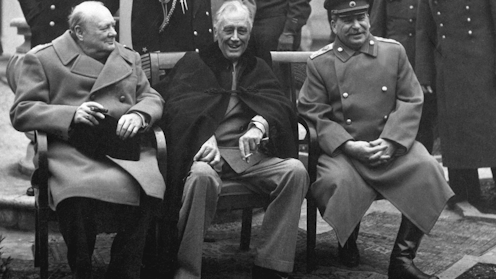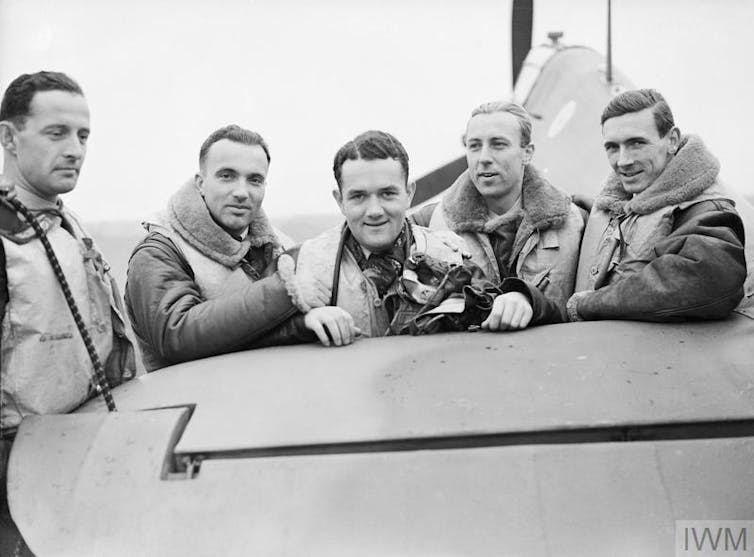
As Britain celebrated Victory in Europe (VE) Day on May 8 1945, the Polish airmen of RAF 305 Bomber Squadron captured a starkly different sentiment in their diary. “‘Victory!’ every Anglo-Saxon says in greeting instead of the traditional ‘Hello!’. The word ‘Victory!’ is devoid of meaning, power and any sense today only for the Poles.”
Despite their critical contributions to the allied war effort, from the Battle of Britain to Monte Cassino, Polish forces felt isolated and betrayed, their hopes of a free Poland crushed by the Yalta agreement. On that first VE Day, many Poles who fought with the allied forces recorded feeling sad, isolated or bitter.
Tadeusz Szumowski, who served in the RAF in Britain found it almost impossible to join in the celebrations. He wrote in his diary: “Our war is lost, the war which we fought so hard and so long to win … It is a very long time since I felt so alone.”
A Polish soldier in Italy wrote: “The war is over – but not for us. The population of the greater part of the world are happy, in consequence; but we are sad. I am afraid that we have lost so many of our best men all for nothing.”
Get your news from actual experts, straight to your inbox. Sign up to our daily newsletter to receive all The Conversation UK’s latest coverage of news and research, from politics and business to the arts and sciences. Join The Conversation for free today.
What made “victory” devoid of meaning for Poles? In her study of Poland during the second world war, historian Halik Kochanski quotes the famed American journalist Martha Gellhorn, who reported from Italy: “All the Poles talk about Russia all the time. The soldiers gather several times a day around the car which houses the radio and listen to the news.”
Many of these soldiers came from eastern Poland, which was invaded by the Soviet Union in 1939. Along with their families, they had been deported to Siberia or Kazakhstan and came out only under a so-called “amnesty” after Russia entered the war on the allied side. Gellhorn reported: “They follow the Russian advance across Poland with agonized interest.”
As I found when researching my book about the diverse nationalities fighting alongside Britain in the second world war, Polish soldiers wrote about Russia all the time as well as talking about it. Their letters were censored and quoted in censorship reports.
As they watched the Russian advance and heard news of the Yalta agreement which consigned Poland to the Soviet sphere of influence, they express anger, fear, bitterness, desolation, a sense of loss and betrayal, shock, bewilderment.
The letters are striking for the many words which take on meanings that demonstrate a gulf that opens up, separating Poles from other allied soldiers. Victory belongs to others while Poles have gone down to a catastrophic defeat.
Russia, widely regarded as a valued ally, is the enemy of Poles. The Polish slogan “For our freedom and yours” is rewritten in one letter: “We are fighting for yours and our freedom, but now I think rather only for yours.” Another letter asks: “What are we fighting for if Poland is to be enslaved?”

Poles find it unbearable to be told that Russia is liberating Poland, using heavy irony. “The ‘liberation’ of Poland by our so-called Allies is causing us great anxiety. Probably my own home will soon be ‘liberated’.”
Another soldier cautions: “Never, never congratulate our people of Warsaw and Poland being ‘liberated’. This sounds like the most cruel irony and is deeply resented by every Pole. You could speak about a lamb being liberated from a bear by a tiger.”
The concept of “home” also acquires new meanings that are devoid of any association with pleasure or belonging. As the war ends, allied soldiers’ thoughts are increasingly about the prospect of returning home – but censors reported in 1944: “Thousands of letters written by Polish soldiers in the last days repeat as a cardinal topic that to Poland governed by communists they won’t return.”
One soldier writes: “It would be better to be killed here on the battlefield than to be alive in the new ‘Red Paradise’ in Poland.” Another writes: “There is no return for us to the Soviet republic of Poland which seems to be the newest invention of our Allies.”
Echoes of Yalta
The Yalta agreement of February 1945 between America, Britain and Russia, the “Big Three” powers, confirmed Poles’ worst fears. Censors report that in the soldiers’ letters, it “overshadows all other topics”, and has “evoked a terrible shock amongst the Polish troops … they find that they are lost and betrayed”.
One soldier writes: “For the last few days I have been in a state of dumb bewilderment. Occasionally I ask myself, ‘Can it be true?’ … I cannot believe that it has really happened.”
Another soldier writes to his “Britisher friend” about his feelings of betrayal: “When this morning we heard the news about the statements from the Big Three meeting we got deadly silent … We sacrificed most of all countries – more than you even. We trusted you so much, and what have we got. Our biger [sic] friend let us go down.”
Yalta is in Crimea – part of the territory annexed by Russia before its full-scale invasion of Ukraine in 2022. The Russian president, Vladimir Putin, has made it clear he will offer no concessions on Ukraine, which he has argued all along he sees as an inalienable part of Russia. This is a stark reminder of Yalta when Josef Stalin made concessions on other matters, but none on Poland.
Trump’s administration has offered Ukraine no security guarantees. Its framework to end the war will allow Russia to retain the territory it has seized. There are now echoes of what one Polish soldier wrote in 1945 of the Yalta agreement: “This business smells and no high-sounding words can disguise the stench of a bad deed.”
Wendy Webster receives funding from the Arts and Humanities Research Council
This article was originally published on The Conversation. Read the original article.







